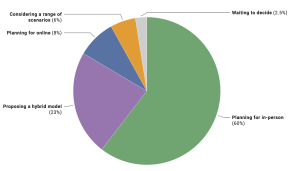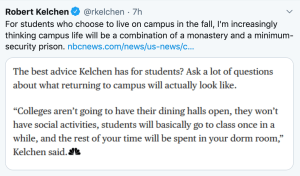
Colleges have been running out of time to release their final plans for the start of the fall school year.
Higher-ed observers assumed that colleges would have to start revealing their final plans sometime in July. Problem was, the vast majority of schools didn’t want to go first.
A Midwestern college, for instance, would be loath to announce it was moving all its classes online in the fall because its competitors could pounce on that and recruit that school’s disappointed students.
COVID-19 and Ivy League Schools
It’s not surprising then that some of the most highly ranked research universities in the country have announced their plans first. They can afford to share their news because students will not abandon these trophy institutions.
Right before the July 4th weekend, Cornell released its plans that allows students to return to campus while offering some classes online and others in person.
On July 6, Harvard and Princeton unveiled their plans for the 2020-2021 school year that guarantees students won’t be happy.
Harvard will permit 40% of undergraduates to live on campus this fall, including the freshmen class and those who need to be present to progress academically. All courses will be online. Depending on the pandemic, a new set of students, with seniors having first priority, will attend in the spring semester.
Princeton’s plans to bring freshmen and juniors back in the fall to attend online classes and seniors and sophomores will get their chance in the spring. Princeton is reducing tuition by 10% while Harvard is sticking with its published price.
Some things to think about…
1. Now that some Ivies have released their plans, we should start seeing final plans for other private and state schools this month.
2. Since COVID-19 uprooted our lives, colleges had been announcing their tentative plans for the fall, but it’s easy to see how many of the plans are more aspirational than realistic.
Exhibit 1 is the number of institutions that have said that they would be holding in-person classes in the fall.
For months, The Chronicle of Higher Education has been keeping a running tally of the plans of 1,075 private and public institutions and 60% have said that they will be holding classes on campus in the fall. Twenty-three percent say they will offer a hybrid solution – a mix of on-campus and distance learning.

With Harvard and Princeton leading the way on embracing a hybrid model for the new school year, they can provide ammunition for more schools to say that that will be their approach too.
3. On many campuses there have been battles among what administrators have envisioned for the fall and what faculty will go along with.
The conflict makes sense for a lot of reasons including this reality – many professors are older and more susceptible to contracting the corona virus. These professors are expected to teach students, who are far less likely to take the virus seriously and are far more likely to act recklessly. That’s a toxic combination.
Schools can insist that they will work incredibly hard to keep everyone safe on campus and make sure 18- and 19-year-olds act responsibly. You’ve got to wonder, however, how can they could possibly pull this off when they have failed miserably to successfully deal with a long-time campus scourge – drunken college students.
It’s not hard to find examples of revolt:
Faculty at such institutions as the University of Illinois, Penn State, Notre Dame and SUNY campuses, have signed petitions complaining about not being consulted and for plans for in-person teaching. More than 850 faculty at Georgia Institute of Technology have signed a letter that opposes the reopening plan that only “strongly encourages” students to wear masks. Professors at Montana State University are also pushing back against reopening policies including wholesale, in-person learning and the absence of a mask mandate.
4. The steps colleges can follow in an attempt to keep everyone safe will vary widely.
Harvard, the nation’s richest university, says that all undergrads will be living in single dorm rooms, the school will be testing students every three days (!!) and contract tracing will be followed. It’s extremely unlikely that most colleges will be able to do a fraction of what Harvard is planning.
Here is something to think about: Even with it’s massive resources and safeguards, Harvard doesn’t think it’s safe to bring all its students back on campus, much less let any of them set foot in a classroom! What does that portend for most schools?
University of California, San Diego plans to test students once a month, which I doubt most schools can do. And that’s not only because of the expense, but also availability of tests.
Before heading back to school, parents and students need to know what the plans are for the relevant campus. At an extremely bare minimum, face masks need to be mandatory in all public spaces except perhaps outdoors with social distancing that needs to be enforced.
5. It’s clear that college will be an entirely different experience for students for the coming academic year.
Robert Kelchen, an associate professor of higher education at Seton Hall University, whom I follow on Twitter, characterized it this way:

6. Be careful to check college housing contracts. Some schools are requiring students to sign a document that states that the room/board charge won’t be refunded if the pandemic forces a school to send students home.
Schools that have gone this route include Virginia Tech, Washington State, South Florida and Western Carolina.
7. Some of the small, residential private colleges, with low endowments and heavy dependency on tuition, were already struggling with attracting enough students in our pre-mask world. Some of these schools are not going to make it.
Check out the financial security of private colleges – pre-COVID – with Forbes financial health ratings. With so many less well-known colleges still looking for students, it’s not too late to bail and find another school.
8. This will be an excellent time to take a gap year.
The traditional college experience is going to vanish for at least a year. If your child has gotten a tremendous price for the year – thanks to COVID-related discounting – then you’d need to weigh the good deal you’ve gotten versus a child’s 2020-2021 experience and the health risk.
Even at this late date, many schools will accept requests to defer an admission for a year. Colleges would rather hope to get a student a year from now than not at all.
9. The U.S. Department Education released its ill-conceived guidance yesterday on how international college students will be treated during the coming school year.
The federal government will only allow international students to stay in the U.S. if their college offers at least some in-person classes. If a college switches to strictly online learning or closes its physical campus during the year due to the pandemic, international students will have to return to their homes or find a school that still has in-person classes. Of course, this is ridiculous and will cause great hardship to these students.
I agree with college insiders who believe that President Trump wants to coerce schools to have in-person classes and punish those that don’t. International students have been a financial lifeline for private and public colleges for years and the prospects of losing these students will make an already bad financial situation worse.

“Schools can insist that they will work incredibly hard to keep everyone safe on campus and make sure 18- and 19-year-olds act responsibly. You’ve got to wonder, however, how can they could possibly pull this off when they have failed miserably to successfully deal with a long-time campus scourge – drunken college students.”
Thanks for addressing this. Colleges have turned a blind-eye to underage drinking on campuses nationwide for forever … and if that doesn’t change this fall all the COVID testing, online learning, single rooms, etc. will be for nothing.
If you’re going to interject politics into your blog post, I suggest you comment on how colleges have become progressive indoctrination factories. A growing problem! International students can still study online like their US counterparts. Rest assured, they’ll still be able to pay their fair share of tuition cost.
Thanks for the insight. My freshman will live on campus and has two in-person classes as a theatre major in a BFA program. I wouldn’t say that this is a great time for a gap year because of the limited things available now for a student to do with the time off. She can’t travel abroad, she can’t audition for acting jobs. There are very few gap-year worthy things available. Also, her hard-earned spot in her program (she is one of 12) and her scholarship are not guaranteed if she takes a year off.
Thank you, Lynn!
I always value your insight! As a secondary school science /math teacher and professional tutor, I am asked constantly by family, friends and customers about what their college child(ren)/young adults should do this fall 2020. Your recommendations, I believe, hit the nail on the head!
Bottom line, until we have an effective vaccination or antibody treatment for this scourge, EVERYONE should act responsibly by social distancing, wearing masks, washing their hands and being cautious. Unfortunately, the irresponsible ones among us do not perceive the risk or the need for caution, only the self-entitled right to do whatever they wish regardless of how it might be harmful to others.
I hope that a college education will help us to decrease the large amount of irresponsibility (maybe insanity?) that we see happening around us now. Thank you again for your insight!
Author
Thanks Randy. We can only wish that increased education will make more people socially responsible. The belief that someone’s first amendment rights trump our right to emerge from this pandemic in a scientifically sound way is beyond mind boggling! And it’s why Europe is opening up and we aren’t! There are a lot of brainwashed people walking around this country without masks on!
Lynn O’Shaughnessy
Hi Lynn,
In point # 7 when you say some of the small, private schools are not going to make it due to low endowments and not enough students, are you able to list some of these schools? My daughter is applying to those types of schools and it makes me a little nervous.
Thank you.
Susan
Author
Hi Susan,
There is no list of these schools. You need to evaluate them individually. Here is a post I wrote earlier in the year that should be able to help:
https://www.thecollegesolution.com/fearing-the-worst-college-closings/
Good luck!
Lynn O’Shaughnessy
I disagree with some of your assessment. Boston College has released their guidelines and they are not as draconian as you insist. Additionally, lots of seniors will live off campus (like my kids plan on doing) which mitigates much of what any university will try to impose. I also believe that the virus is weakening (increased testing=increased cases but has not equaled increased deaths or ICU being overwhelmed). Time to end the panic porn related to covid. Young people are not dying in droves despite being among the highest number of positive Cases. The media was all about reporting the number of deaths and has now switched to number of cases. There is a very real difference between the two.
I appreciate what you write for Freshman, but for seniors in particular who need to graduate, the experience will be entirely different.
Author
Hi Ellen,
Boston College hasn’t finalized it’s reopening plans so it’s impossible to know what will happen on that campus yet. The fact that lots of BC students will be living off campus is not something that I would consider reassuring. Reckless behavior off campus – no masks, no social distancing – will endanger others on campus and in the community.
The number of cases is rising, in part because of careless and thoughtless behavior of younger people that is going to be increased in spades at college campuses. These students can pass on the virus to faculty and staff and can bring it home to parents, grandparents and others in the community when they return to school.
I realize Trump and his followers are pushing a rosy scenario in the shameful absence of a national policy to fight this virus, which is a big reason why countries in the European Union are opening, but we are floundering and in a much bigger mess. I believe in science and what the medical professionals are saying and I just hope colleges follow the science and not the political posturing.
Lynn O’Shaughnessy
Lynn O’Shaughnessy
Lynn, thanks for the insights! As an IEC, and a parent now having two students in college here locally, there is a lot to consider. The public college my kiddos will be attending is doing a hybrid approach, requiring masks in all indoor settings, shifting class schedules to be spread out more throughout the day and evening, moving some classes to only once or twice a week instead of traditional times, moving classes into larger venues to allow social distancing, and encouraging outdoor class settings weather permitting. We’ll see how that goes come winter here in Colorado. My oldest will continue to live on campus in a single room and is in constant contact with the RA and housing director. There have been some hiccups regarding athletes moving back in early, even one testing positive for Covid. My other student will be living at home and going to some classes in person, while others have been moved to online. She is an Art major so that will be interesting to see how they conduct those classes.
Author
Thanks Kirk for sharing! I wish your children the best of luck!
Lynn O’Shaughnessy